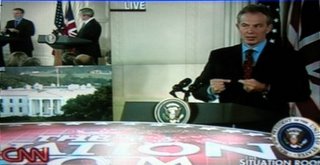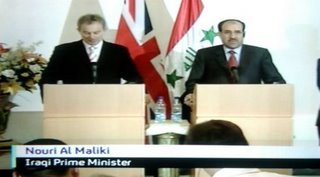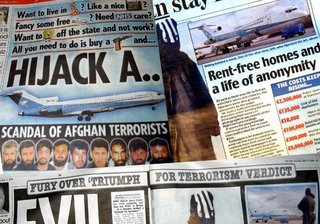
On Thursday Tony Blair made his eighth visit to the United States since 9/11. In a 55 minute press conference, and after three years of war in Iraq, the British Prime Minister was upbeat and positive. He acknowledged the decision to remove Saddam was divisive but having talked to the leaders in Iraq he was resolute in providing support to the Iraqi people until the mission was complete. He seemed however to have forgotten the original reason the war was initiated. It was not about regime change, but for reasons of world security because of threat from Iraq’s ‘weapons of mass destruction’. Weapons which were never subsequently found. The situation has moved on since then, and a new government has now been formed. Asked by Sky’s Adam Bolton whether he hoped for a United Nations which might offer the option of pre-emptive action, Mr Blair said: “There are threats in the world today which require us to act earlier and more effectively…but I think when we look at this global terrorism which we face there is, to me at any rate, a very clear link between the terrorism that is affecting virtually every country in the western world, the Middle East and the terrorism in Iraq in Afghanistan, and we must be as determined to defeat the terrorism as much as they are determined to see us fail. And if we do succeed, as I believe that we will, in Iraq and Afghanistan, then the whole of international terrorism will suffer a defeat.”
George Bush quickly interjected: “I would like to see a United Nations that is more effective, one that joins us to rid the world of tyranny, one that is willing to advance human rights and human dignity, one that’s unabashed in their desire to spread freedom, that’s what I’d like to see. Because I believe that freedom will yield the peace, I also believe that freedom is universal, I don’t believe that freedom is just a concept for the United States or Great Britain, it is a universal concept. And it troubles me to know that there’s people locked up in tyrannical societies that suffer. And the United Nation ought to be clear about its desire to liberate people from the clutches of tyranny.”
“We have spent a great deal of time talking about the Iranian issue, and one of the goals that Tony and I have is to convince others in the world that Iran with a nuclear weapon would be very dangerous. We want to convince the Iranians that the coalition we’ve put together is very serious, one option is the United Nations Security Council if Iran won’t suspend as we have asked them to. And it is their choice right now. They are the ones who have walked away from the negotiating table,” the President emphasised. He added that he’d read Ahmedinejad’s letter: “It was 16 or 17 single spaced, typed pages, but he didn’t address the issue of whether or not they are going to press for a nuclear weapon, that’s the issue at hand.” And he said he’d keep up the pressure on the country. Blair backed the President and said that Iran “must understand that the obligations upon them must be adhered to.”
Returning to Iraq, President Bush described al-Qaeda as a threat to not only the west but also the neighbouring Muslim countries: “These are Islamic fascists, and a free Iraq will see an end to the threats we face”.
As the pressure builds towards a new conflict with Iran, questions over whether the coalition had made mistakes in the continuing War on Terror were raised. “Sounds like a bit of a familiar refrain here,” George Bush said. “Saying ‘Bring it On’, the kind of tough talk that sent the wrong signal. I learnt some, er, lessons about presenting myself in a more sophisticated manner. You know, ‘wanted dead or alive’, that kind of talk. I think in certain parts of the world it was misinterpreted. I think the biggest mistake, at least from our country’s point of view, in Iraq is Abu Ghraib. We’ve been paying for that for a long period of time” Tony Blair said that in retrospect “de-baathification” was a mistake.
Pressure on the Blair government at home precipitated a question to the Prime Minister, “This is probably your last visit to Washington as Prime Minister…”, but the President quickly interjected, “Wait a minute, back to back disses..” The journalist continued, “Well, at least the beginning of the end of a special relationship, will you miss the President, and what will you miss about him, and to the President what will you miss about Tony Blair and what are you looking for in an eventual replacement?” The President spoke with full support, as well as his usual wit, “I’ll miss those red ties, I say just one thing… don’t count him out, I know a man of resolve and vision and courage. My attitude is that I want him here so long as I am President.” The Prime Minister could only grin, adding, “Well, what more can I say? Probably wise not to say anything more at all” He then urged the British delegation of journalist to ask a few serious questions. George Bush ended proceedings with this, “Mr Prime Minister, can I buy you dinner.
As the Prime Minister and the President sat down to dinner, bombs continued to kill dozens in Iraq. At least 13 were killed as suicide bombers targeted market places in Baghdad [
BBC] and more than 60 were injured. Paranoia created panic in Washington later on Friday after a worker using an air hammer sparked a security scare at the Rayburn House Office Building [
CNN /
Sky News]. And on a trip to Cuba, MP George Galloway caused further consternation after he suggested it was ‘morrally right’ if Prime Minister Blair was targeted for assassination by those fighting the coalition’s invasion of the country [
BBC /
CNN]. With regards mistakes in the fight against terrorism, further troubles were revealed Friday when it was announced that several Marines faced charges over the deaths of up to two dozen Iraqi civilians in Haditha last November. Haditha is about 225 km [140 miles] northwest of Baghdad. The military has said 15 civilians were killed, while a senior Republican lawmaker last week put the number at about 24.
The Los Angeles Times reported that military investigators had concluded that a dozen Marines acted improperly in an incident in which U.S. troops, after a Marine was killed by a roadside bomb, wantonly killed unarmed civilians, including women and children, and then tried to cover up the incident [
Reuters].















